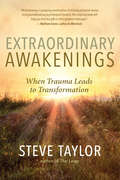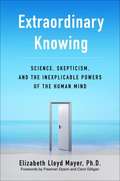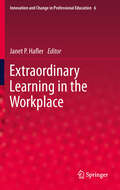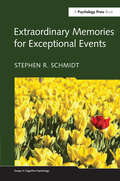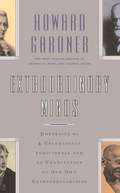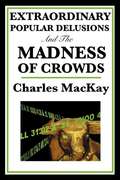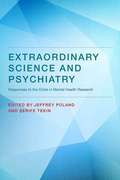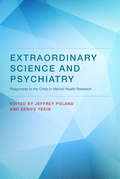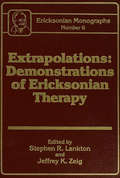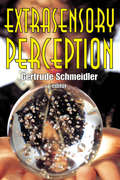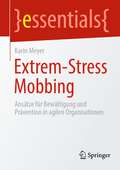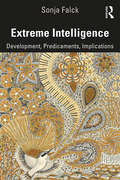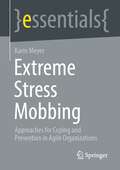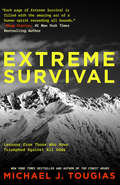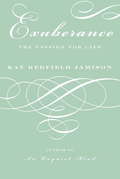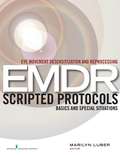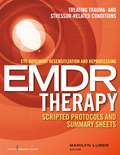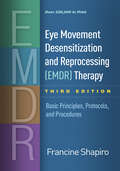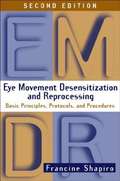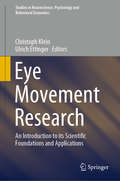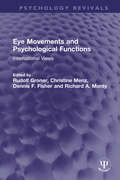- Table View
- List View
Extractive Industries and Changing State Dynamics in Africa: Beyond the Resource Curse (Routledge Studies in African Development)
by Jon Schubert Ulf Engel Elísio MacamoThis book uses extractive industry projects in Africa to explore how political authority and the nation-state are reconfigured at the intersection of national political contestations and global, transnational capital. Instead of focusing on technological zones and the new social assemblages at the actual sites of construction or mineral extraction, the authors use extractive industry projects as a topical lens to investigate contemporary processes of state-making at the state–corporation nexus. Throughout the book, the authors seek to understand how public political actors and private actors of liberal capitalism negotiate and redefine notions and practices of sovereignty by setting legal, regulatory and fiscal standards. Rather than looking at resource governance from a normative perspective, the authors look at how these negotiations are shaped by and reshape the self-conception of various national and transnational actors, and how these jointly redefine the role of the state in managing these processes for the ‘greater good’. Extractive Industries and Changing State Dynamics in Africa will be useful for researchers, upper-level students and policy-makers who are interested in new articulations of state-making and politics in Africa.
Extraordinary Awakenings: When Trauma Leads to Transformation
by Steve TaylorA compelling investigation of how intense psychological suffering can lead to a dramatic shift into a new, expansive identity Why do some people who experience the worst that life has to offer respond not by breaking down but by shifting up, into a higher-functioning, awakened state, like phoenixes rising from the ashes? And perhaps more importantly, how can we emulate their transformations? Over many years of observing and studying the phenomenon of life-changing awakening through extreme suffering, Steve Taylor coined the term &“transformation through turmoil.&” He calls these people &“shifters&” and here shares dozens of their amazing stories. In addition, Taylor uncovers the psychological processes that explain these miraculous rebirths after years of struggle or devastating loss, addiction, or imprisonment. He highlights a number of lessons and guidelines that the shifters offer us. In Extraordinary Awakenings, readers will find not only riveting stories of transformation that show the amazing resilience of the human spirit, but also hope and guidance to call on during their own struggles, together with inspiration and profound food for thought.
Extraordinary Knowing: Science, Skepticism, and the Inexplicable Powers of the Human Mind
by Elizabeth Lloyd MayerIn 1991, when her daughter's rare, hand-carved harp was stolen, Lisby Mayer's familiar world of science and rational thinking turned upside down. After the police failed to turn up any leads, a friend suggested she call a dowser--a man who specialized in finding lost objects. With nothing to lose--and almost as a joke--Dr. Mayer agreed. Within two days, and without leaving his Arkansas home, the dowser located the exact California street coordinates where the harp was found.
Extraordinary Learning in the Workplace
by Janet P. HaflerThe contributing authors of this multidisciplinary text agree that workplace learning truly is extraordinary when it is marked by structural congruence and a positive synergy among the intended and formal preparation of professionals, that tacit learning occurs within the hidden curriculum, and that the subsequent demands, both formal and tacit, are embedded in subsequent workplace settings. Thus, for this text, these authors explore research and practice literature related to curriculum, instruction and assessment of professionals' learning in the workplace and the implications for best practices. But what makes this book truly unique is that the authors examine that literature in the context of four professions--education, nursing, medicine and clergy--at the point of those professions wherein students are learning during the degree program stages of their education. Extraordinary Learning in the Workplace is broken into four main sections. Part I explores curriculum, both formal and hidden. Part II focuses on conceptions and theories of learning and instruction and is intended to inform the work of educators with regard to components of professional education that occur in the practice settings of the workplace. Part III covers assessment, using medicine as its example to argue that assessment has remained largely unchanged for years, thus making the multiple choice questions tests introduced in the 1950s the de facto gold standard for "quality" assessment. And Part IV focuses on the training of the instructors, visiting the three key themes of relationships, activities or tasks, and work practices.
Extraordinary Memories for Exceptional Events (Essays in Cognitive Psychology)
by Stephen R. SchmidtNot all memories are created equal. Our memories for some very exceptional events seem to stand out in our minds, and as such they may form the very core of who we are. Perhaps you have a vivid recollection of a fateful day, an unforgettable face, or a hilarious joke. This book summarizes theories and data that provide insight into these extraordinary memories for exceptional events. The book begins with a classification scheme for exceptional events, followed by a theoretical overview grounded in four metaphors of memory. The classification scheme and theoretical perspectives are used to explore topics including: flashbulb memories, the influence of emotion on memory, the bizarre imagery effect, the humor effect, the serial position effect, and the isolation effect. The conclusion provides a framework for understanding these outstanding memories for exceptional events.
Extraordinary Minds: Portraits of Exceptional Individuals and an Examination of Our Extraordinariness
by Howard GardnerFifteen years ago, psychologist and educator Howard Gardner introduced the idea of multiple intelligences, challenging the presumption that intelligence consists of verbal or analytic abilities only-those intelligences that schools tend to measure. He argued for a broader understanding of the intelligent mind, one that embraces creation in the arts and music, spatial reasoning, and the ability to understand ourselves and others. Today, Gardner’s ideas have become widely accepted-indeed, they have changed how we think about intelligence, genius, creativity, and even leadership, and he is widely regarded as one of the most important voices writing on these subjects. Now, in Extraordinary Minds, a book as riveting as it is new, Gardner poses an important question: Is there a set of traits shared by all truly great achievers-those we deem extraordinary-no matter their field or the time period within which they did their important work?In an attempt to answer this question, Gardner first examines how most of us mature into more or less competent adults. He then examines closely four persons who lived unquestionably extraordinary lives-Mozart, Freud, Woolf, and Gandhi-using each as an exemplar of a different kind of extraordinariness: Mozart as the master of a discipline, Freud as the innovative founder of a new discipline, Woolf as the great introspector, and Gandhi as the influencer. What can we learn about ourselves from the experiences of the extraordinary? Interestingly, Gardner finds that an excess of raw power is not the most impressive characteristic shared by superachievers; rather, these extraordinary individuals all have had a special talent for identifying their own strengths and weaknesses, for accurately analyzing the events of their own lives, and for converting into future successes those inevitable setbacks that mark every life. Gardner provides answers to a number of provocative questions, among them: How do we explain extraordinary times-Athens in the fifth century B. C. , the T’ang Dynasty in the eighth century, Islamic Society in the late Middle Ages, and New York at the middle of the century? What is the relation among genius, creativity, fame, success, and moral extraordinariness? Does extraordinariness make for a happier, more fulfilling life, or does it simply create a special onus?
Extraordinary Popular Delusions and the Madness of Crowds
by Charles MackayExtraordinary Popular Delusions and the Madness of Crowds is a history of popular folly by Charles Mackay. The book chronicles its targets in three parts: "National Delusions," "Peculiar Follies," and "Philosophical Delusions." Learn why intelligent people do amazingly stupid things when caught up in speculative edevorse. The subjects of Mackay's debunking include alchemy, beards (influence of politics and religion on), witch-hunts, crusades, and duels. Present day writers on economics, such as Andrew Tobias, laud the three chapters on economic bubbles.
Extraordinary Responsibility
by Shalini SatkunanandanCareful attention to contemporary political debates, including those around global warming, the federal debt, and the use of drone strikes on suspected terrorists, reveals that we often view our responsibility as something that can be quantified and discharged. Shalini Satkunanandan shows how Plato, Kant, Nietzsche, Weber, and Heidegger each suggest that this calculative or bookkeeping mindset both belongs to 'morality', understood as part of our ordinary approach to responsibility, and effaces the incalculable, undischargeable, and more onerous dimensions of our responsibility. These thinkers also reveal how the view of responsibility as calculable is at the heart of 'moralism' - the pettifogging, mindless, legalistic, excessively judgmental, or punitive policing of our own or others' compliance with moral duties. By elaborating their narratives of a difficult 'conversion' to the open-ended and relentless character of responsibility, Satkunanandan explores how we might be less moralistic and more responsible in politics. She ultimately argues for a political ethos attentive to how calculative thinking can limit our responsibility, but that still accepts a circumscribed place for calculation (and morality) in responsible politics.
Extraordinary Science and Psychiatry: Responses to the Crisis in Mental Health Research
by Jeffrey Poland Serife TekinPsychiatry and mental health research is in crisis, with tensions between psychiatry's clinical and research aims and controversies over diagnosis, treatment, and scientific constructs for studying mental disorders. At the center of these controversies is the Diagnostic and Statistical Manual of Mental Disorders (DSM), which -- especially after the publication of DSM-5 -- many have found seriously flawed as a guide for research. This book addresses the crisis and the associated "extraordinary science" (Thomas Kuhn's term for scientific research during a state of crisis) from the perspective of philosophy of science. The goal is to help reconcile the competing claims of science and phenomenology within psychiatry and to offer new insights for the philosophy of science. The contributors discuss the epistemological origins of the current crisis, the nature of evidence in psychiatric research, and the National Institute for Mental Health's Research Domain Criteria project. They consider particular research practices in psychiatry -- computational, personalized, mechanistic, and user-led -- and the specific categories of schizophrenia, depressive disorder, and bipolar disorder. Finally, they examine the DSM's dubious practice of pathologizing normality.ContributorsRichard P. Bentall, John Bickle, Robyn Bluhm, Rachel Cooper, Kelso Cratsley, Owen Flanagan, Michael Frank, George Graham, Ginger A. Hoffman, Harold Kincaid, Aaron Kostko, Edouard Machery, Jeffrey Poland, Claire Pouncey, Serife Tekin, Peter Zachar
Extraordinary Science and Psychiatry: Responses to the Crisis in Mental Health Research (Philosophical Psychopathology)
by Jeffrey Poland Şerife TekinLeading scholars offer perspectives from the philosophy of science on the crisis in psychiatric research that exploded after the publication of DSM-5.Psychiatry and mental health research is in crisis, with tensions between psychiatry's clinical and research aims and controversies over diagnosis, treatment, and scientific constructs for studying mental disorders. At the center of these controversies is the Diagnostic and Statistical Manual of Mental Disorders (DSM), which—especially after the publication of DSM-5—many have found seriously flawed as a guide for research. This book addresses the crisis and the associated “extraordinary science” (Thomas Kuhn's term for scientific research during a state of crisis) from the perspective of philosophy of science. The goal is to help reconcile the competing claims of science and phenomenology within psychiatry and to offer new insights for the philosophy of science. The contributors discuss the epistemological origins of the current crisis, the nature of evidence in psychiatric research, and the National Institute for Mental Health's Research Domain Criteria project. They consider particular research practices in psychiatry—computational, personalized, mechanistic, and user-led—and the specific categories of schizophrenia, depressive disorder, and bipolar disorder. Finally, they examine the DSM's dubious practice of pathologizing normality.ContributorsRichard P. Bentall, John Bickle, Robyn Bluhm, Rachel Cooper, Kelso Cratsley, Owen Flanagan, Michael Frank, George Graham, Ginger A. Hoffman, Harold Kincaid, Aaron Kostko, Edouard Machery, Jeffrey Poland, Claire Pouncey, Şerife Tekin, Peter Zachar
Extrapolations: Demonstrations Of Ericksonian Therapy : Ericksonian Monographs 6 (Ericksonian Monograph Ser. #No.6)
by Jeffrey K. Zeig Stephen R. LanktonFirst Published in 1990. Routledge is an imprint of Taylor & Francis, an informa company.
Extrasensory Perception
by Gertrude SchmeidlerIf extrasensory perception is a common human ability, why can't we all score high on ESP tests? This book answers the question by describing psychological determinants of success and failure in extrasensory perception. Some of the most signifi cant points raised in the editor's enlightening introduction are developed in greater detail in the nine essays that follow, all of them important statements giving a clear picture of research into ESP and the debate that surrounds it. Each essay is followed by a comment relating the essay to the field as a whole.In essays on the debate about ESP, an attack (by C. E. M. Hansel) is followed by a rebuttal (by J. B. Rhine and J. G. Pratt), offering the reader insight into the peculiar tension surrounding the ESP controversy. The book also includes a balanced overview of problems in the field by J. C. Crumbaugh, and six other essays on the psychological factors that influence research on ESP. Controversy over ESP is of special interest also because the questions critics raise relate closely to problems within psychology itself. In addition, the essays reflect a quality common to much research: the excitement of uncovering results that advance our knowledge.This book is intended for supplementary course use. Because of the fundamental problems it addresses, it also offers richly rewarding reading for all teaching and practicing psychologists as well as for the interested generalist. A substantial number of research reports are cited throughout, so that any reader seeking further information will find the cited references invaluable.
Extrem-Stress Mobbing: Ansätze für Bewältigung und Prävention in agilen Organisationen (essentials)
by Karin MeyerNeben einem hohen Termin- und Erfolgsdruck, emotionalem Stress sowie einem schlechten Arbeitsklima gehört Mobbing zu den stärksten Stress-Belastungen, denen Arbeitnehmer*innen im Arbeitsalltag ausgesetzt sind. Arbeitgeberseitig werden Konflikte zwischen Mitarbeiter*innen meist als Störfaktor empfunden. Gleichzeitig besteht für Betroffene oftmals das Problem, die Situation rechtzeitig und vollständig zu erfassen. Beleuchtet werden daher neben möglichen Verhaltensweisen von Mobbern auch Auslöser für diese Form aggressiven Verhaltens sowie mobbingfördernde Arbeits- und Rahmenbedingungen, beispielsweise agiler Organisationen – ebenso Ansätze zur Bewältigung und Prävention.
Extreme Intelligence: Development, Predicaments, Implications
by Sonja FalckExtreme intelligence is strongly correlated with the highest of human achievement, but also, paradoxically, with higher relationship conflict, career difficulty, mental illness, and high-IQ crime. Increased intelligence does not necessarily increase success; it should be considered as a minority special need that requires nurturing. This book explores the social development and predicaments of those who possess extreme intelligence, and the consequent personal and professional implications for them. It uniquely integrates insights and knowledge from the research fields of intelligence, giftedness, genius, and expertise with those from depth psychology, emphasising the importance of finding ways to talk effectively about extreme intelligence, and how it can better be supported and embraced. The author supports her arguments throughout, reviewing the academic literature alongside representations of genius in history, fiction, and the media, and draws on her own first-hand research interviews and consulting work with multinational high-IQ adults. This book is essential reading for anyone supporting or working with the highly gifted, as well as those researching or interested by the field of intelligence.
Extreme Stress Mobbing: Approaches for Coping and Prevention in Agile Organizations (essentials)
by Karin MeyerIn addition to high pressure to meet deadlines and succeed, emotional stress and a poor working atmosphere, bullying is one of the most severe stresses to which employees are exposed in their everyday working lives. Employers usually perceive conflicts between employees as a disruptive factor. At the same time, it is often difficult for those affected to grasp the situation completely and in good time. Therefore, in addition to possible behaviors of mobbers, triggers for this form of aggressive behavior as well as working and general conditions conducive to mobbing, such as agile organizations, are examined - as well as approaches to coping and prevention.
Extreme Survival: Lessons from Those Who Have Triumphed Against All Odds
by Michael J TogiasWitness True Resilience in These Incredible Survival Stories“Michael Tougias converts the wisdom of survivors into advice we can all use...” —Amanda Ripley, bestselling author of The Unthinkable: Who Survives When Disaster Strikes—and Why#1 New Release in Disaster ReliefExtreme Survival will have you on the edge-of-your-seat with truly amazing survival stories.New York Times bestselling author Michael Tougias has earned critical acclaim and literary awards for his many best-seller non-fiction narratives. Extreme Survival is the long-awaited follow-up to The Finest Hours, co-authored with Casey Sherman.Explore the stories and the causes of manmade disasters. To answer the question of why disasters happen and how some survive, Tougias interviewed over 100 people who survived against all odds, first chronicling their harrowing survival stories, and then discussing in detail lessons learned. Extreme Survival delivers the entertainment and exceptional research Michael Tougias fans expect.Understand resilience through the mindset of survivors. Surviving disasters requires survival techniques to kick in at the right moment. Learn what a person is capable of when under extreme pressure and facing imminent disaster.Inside find:Captivating and narrative survival stories told in true Tougias trademark styleAnalysis of major man-made disasters and the faulty decisions that led to themFirst-person accounts and detailed survival tactics that can apply to your every-day lifeIf you like true survival books like The Greatest Survival Stories of All Time, Into Thin Air, The Gift of Fear, Into the Abyss, Deep Survival, or If I Live Until Morning, you’ll love Extreme Survival. Also don’t miss reading other Michael Tougais survival books, including Fatal Forecast, Ten Hours Until Dawn, A Storm Too Soon, and Overboard!
Extremism and the Psychology of Uncertainty (Blackwell/Claremont Applied Social Psychology Series #8)
by Danielle L. Blaylock Michael A. HoggExtremism and the Psychology of Uncertainty showcases cutting-edge scientific research on the extent to which uncertainty may lead to extremism. Contributions come from leading international scholars who focus on a wide variety of forms, facets and manifestations of extremist behavior. Systematically integrates and explores the growing diversity of social psychological perspectives on the uncertainty extremism relationship Showcases contemporary cutting edge scientific research from leading international scholars Offers a broad perspective on extremism and focuses on a wide variety of different forms, facets and manifestations Accessible to social and behavioral scientists, policy makers and those with a genuine interest in understanding the psychology of extremism
Exuberance
by Kay Redfield JamisonWith the same grace and breadth of learning she brought to her studies of the mind's pathologies, Kay Redfield Jamison examines one of its most exalted states: exuberance. This "abounding, ebullient, effervescent emotion" manifests itself everywhere from child's play to scientific breakthrough and is crucially important to learning, risk-taking, social cohesiveness, and survival itself. Exuberance: The Passion for Life introduces us to such notably irrepressible types as Teddy Roosevelt, John Muir, and Richard Feynman, as well as Peter Pan, dancing porcupines, and Charles Schulz's Snoopy. It explores whether exuberance can be inherited, parses its neurochemical grammar, and documents the methods people have used to stimulate it. The resulting book is an irresistible fusion of science and soul.From the Trade Paperback edition.
Exuberance: The Passion for Life
by Kay Redfield JamisonPsychologist Kay Redfield Jamison explores and discusses exuberance and other positive moods and emotions.
Eye Movement Desensitization and Reprocessing (EMDR) Scripted Protocols: Basics and Special Situations
by Marilyn LuberThis excellent book contains many different scripts, applicable to a number of special populations. It takes a practical approach and walks therapists step-by-step through the EMDR therapeutic process. This book serves as a one-stop resource where therapists can access a wide range of word-for-word scripted protocols for EMDR practice, including the past, present, and future templates. These scripts are conveniently outlined in an easy-to-use, manual style template for therapists, allowing them to have a reliable, consistent form and procedure when using EMDR with clients. The book contains an entire section on the development of resources and on clinician self-care. There is a self-awareness questionnaire to assist clinicians in identifying potential problems that often arise in treatment, allowing for strategies to deal with them. Also included are helpful past memory, current triggers and future template worksheet scripts. Key topics include: Client history taking that will inform the treatment process of patients Resource development to help clients identify and target their problems to regain control when issues appear overwhelming Scripts for the 6 basic EMDR Protocols for traumatic events, current anxieties and behaviors, recent traumatic events, phobias, excessive grief, and illness and somatic disorders Early intervention procedures for man-made and natural catastrophes EMDR and early interventions for groups, including work with children, adolescents, and adults Written workbook format for individual or group EMDR EMDR to enhance performance and positive emotion.
Eye Movement Desensitization and Reprocessing (EMDR) Therapy Scripted Protocols and Summary Sheets: Treating Trauma- and Stressor-Related Conditions
by Marilyn LuberThis book focuses on EMDR Therapy as a psychotherapy approach based on standard procedures and protocols for trauma and stressor-related conditions. Using EMDR Therapy’s standard procedures and protocols as its template, this book presents step-by-step scripts that enable new practitioners and seasoned EMDR clinicians, trainers, and consultants alike to incorporate EMDR Therapy into their case conceptualizations and treatment plans while working with patients who have issues related to trauma, and stressor-related conditions. These scripts can be put to use immediately and retain the complete integrity of EMDR Therapy by presenting the three-prong protocol (past memories, present triggers, and future templates) and the 11-step procedure essential to the standard practice of EMDR Therapy. The chapters are conveniently presented in an easy-to-use manual-style format that facilitates a reliable, consistent procedure. Scripts and summary sheets are available in an expandable, downloadable format for easy digital access for each protocol to simplify the gathering of information and to document it in clients’ charts in a consistent format. This facilitates quick retrieval of the essential issues and components needed by clinicians to create appropriate treatment plans.
Eye Movement Desensitization and Reprocessing (EMDR) Therapy, Third Edition: Basic Principles, Protocols, and Procedures
by Francine ShapiroThe authoritative presentation of Eye Movement Desensitization and Reprocessing (EMDR) therapy, this groundbreaking book--now revised and expanded--has enhanced the clinical repertoires of more than 100,000 readers and has been translated into 10 languages. Originally developed for treatment of posttraumatic stress disorder (PTSD), this evidence-based approach is now also used to treat adults and children with complex trauma, anxiety disorders, depression, addictive behavior problems, and other clinical problems. EMDR originator Francine Shapiro reviews the therapy's theoretical and empirical underpinnings, details the eight phases of treatment, and provides training materials and resources. Vivid vignettes, transcripts, and reproducible forms are included. Purchasers get access to a Web page where they can download and print the reproducible materials in a convenient 8 1/2" x 11" size. New to This Edition *Over 15 years of important advances in therapy and research, including findings from clinical and neurophysiological studies. *New and revised protocols and procedures. *Discusses additional applications, including the treatment of complex trauma, addictions, pain, depression, and moral injury, as well as post-disaster response. *Appendices with session transcripts, clinical aids, and tools for assessing treatment integrity and outcomes. EMDR therapy is recognized as a best practice for the treatment of PTSD by the U.S. Departments of Veterans Affairs and Defense, the International Society for Traumatic Stress Studies, the World Health Organization, the U.K. National Institute for Health and Care Excellence (NICE), the Australian National Health and Medical Research Council, the Association of the Scientific Medical Societies in Germany, and other health care associations/institutes around the world.
Eye Movement Desensitization and Reprocessing (EMDR), Second Edition
by Francine ShapiroThis volume provides the definitive guide to Eye Movement Desensitization and Reprocessing (EMDR), the psychotherapeutic approach developed by Francine Shapiro. EMDR is one of the most widely investigated treatments for posttraumatic stress disorder, and many other applications are also being explored. Presenting background on EMDR's development, theoretical constructs, and possible underlying mechanisms, the volume also contains detailed descriptions and transcripts that guide the clinician through every stage of therapeutic treatment, from client selection to the administration of EMDR and its integration within a comprehensive treatment plan. Among the many clinical populations for whom the material in this volume has been seen as applicable are survivors of sexual abuse, crime, and combat, as well as sufferers of phobias and other experientially based disorders. New to This Edition Updated neurobiological data, findings from controlled clinical studies, and literature on emerging clinical applications. Updated protocols and procedures for working with adults and children with a range of presenting problems. Special feature Two online-only appendices were added in 2009. These appendices comprehensively review current research on EMDR and its clinical applications.
Eye Movement Research: An Introduction to its Scientific Foundations and Applications (Studies in Neuroscience, Psychology and Behavioral Economics)
by Christoph Klein Ulrich EttingerThis edited volume presents fundamentals as well as applications of oculomotor methods in industrial and clinical settings. The topical spectrum covers 1.) basics and background material, 2.) methods such as recording techniques, markov models, Lévy flights, pupillometry and many more, as well as 3.) a broad range of applications in clinical and industrial settings. The target audience primarily comprises research experts and practitioners, but the book may also be beneficial for graduate students.
Eye Movements and Psychological Functions: International Views (Psychology Revivals)
by Rudolf Groner, Christine Menz, Dennis F. Fisher, Richard A. MontyOriginally published in 1983, this volume represents the edited proceedings of the first conference organized by the European Group for Eye Movement Research with the theme "Eye Movements: Current Research and Methodology". The conference was held at the Department of Psychology, University of Bern, Switzerland in 1981. The book is divided into four parts covering: Methods; Central and Peripheral Processing; Picture Viewing and Visual Tracking; and Cognitive Processes and Reading. Each part is introduced by one of the session chairpersons of the conference.

